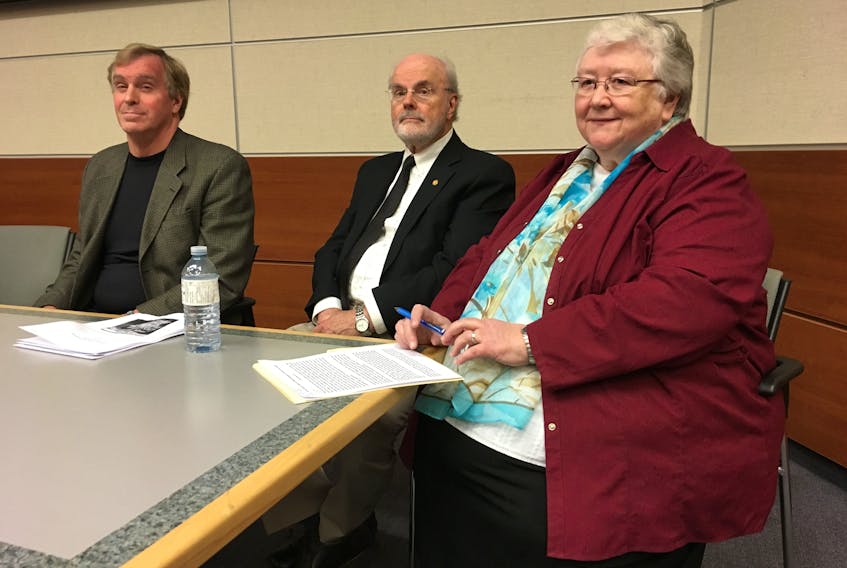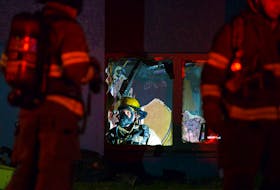The true purpose of a commission of inquiry is to be a catalyst for change. It should be an opportunity to reflect on the course that’s been taken, identify what was done poorly along the way and suggest ways to improve as a project moves forward.
Whether that happens with the upcoming two-year Muskrat Falls inquiry remains to be seen.
Monday night at Memorial University, the inquiry was the subject of a panel discussion titled “Making the Muskrat Falls Inquiry Right.” Sponsored by MUN’s departments of anthropology and political science, it featured Sister Elizabeth Davis, congregational leader of the Sisters of Mercy of Newfoundland and Labrador, Labrador Land Protectors member Jim Learning — via teleconference— and MUN political science professor Dr. Stephen Tomblin, and economist David Vardy.
Much of the discussion focused on the terms of reference for commissioner Justice Richard LeBlanc and his co-counsels.
In their current form, Davis stated, the terms focus on what’s already taken place in terms of the costs and transparency, and doesn’t look ahead.
“If it does not, it will be a waste of time, it will be a waste of money, it will be the loss of an opportunity to help redirect something which seems to be going in the wrong direction,” said Davis.
She believes there are articles within the terms that allow the possibility of addressing what she believes are three major ongoing concerns: a debt load that will result in a reduction of services affecting all residents of the province, especially the most vulnerable; current and long-term environmental risks; and dire social consequences.
“If the commissioner, in preparing the inquiry, chooses to ignore these ongoing risks and looks only to the risks that have already happened, then the people will not be well served by the inquiry,” Davis contended.
“Right now this inquiry seems to be the only option people like us have to speak to this problem.”
Which is why she and her peers stressed the importance of citizen engagement to allow the voices of the average Newfoundlanders and Labradorians to be heard among the din of experts in administration, construction, engineering and finance.
“Just think of the positive change this commissioner and his inquiry could achieve if he brought together indigenous peoples, businesses, professions, the volunteer sector, academic researchers, religious organizations, activists, journalists and ordinary everyday citizens all focused on one thing: taking something that could threaten our very future in most fundamental ways and turn it into something that would be for the good of this province.”
Davis also referenced the need for an interim report, a sentiment echoed by Vardy in his presentation.
“We’ve got three years to go before this project is finished. There are things we should learn about what mistakes we’ve made over the last number of years that we can apply in the future, that’s one of the reasons why I believe there needs to be an interim report,” Vardy stated.
The former public servant and longtime critic of the hydroelectric project was critical of the terms of reference, suggesting that they don’t clearly indicate what the inquiry is about and don’t deal with issues surrounding the environment, health or safety.
“Those issues deserve to be dealt with on their own merit and they shouldn’t be up to the discretion of the commissioner.”
Tomblin, meanwhile, spoke about the knowledge gaps within the project like ecological impacts, engineering design, shale-gas revolutions, and United States energy rules, regulations and needs.
“We didn’t anticipate it and if you’re going to put all this effort into building new forms of energy and infrastructure around it, the costs of which are considerable, we need to have an understanding of what’s happening in our neighbours and in other jurisdictions, including the Maritimes, including Quebec,” he said.
“I think a successful inquiry will need an instrument of policy with an eye to building knowledge resources.”
Like Vardy, Tomblin takes issue with the terms of reference. He says they lack a framework and don’t deal enough with forms of engagement to bring more voices and knowledge the discussion. It also needs to examine what’s happening elsewhere in Canada — like British Columbia’s Site C, a controversial and expensive dam project that that province just decided to proceed with.
“I think to have a study of Newfoundland and Labrador only is a mistake,” Tomblin said. “We need to understand and recognize that there are certain structural or institutional core problems which have to be addressed.”
[email protected]
Twitter: kennoliver79









